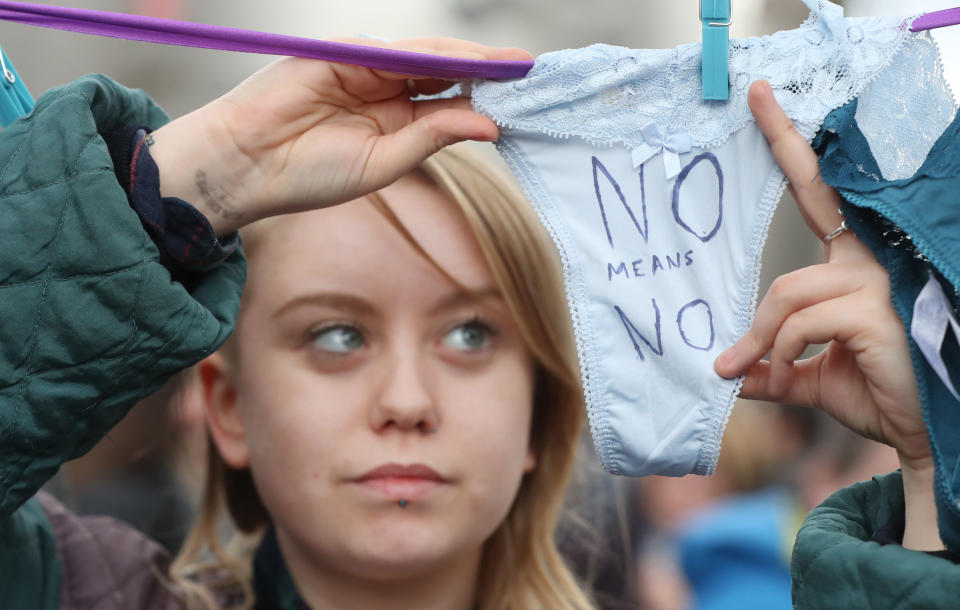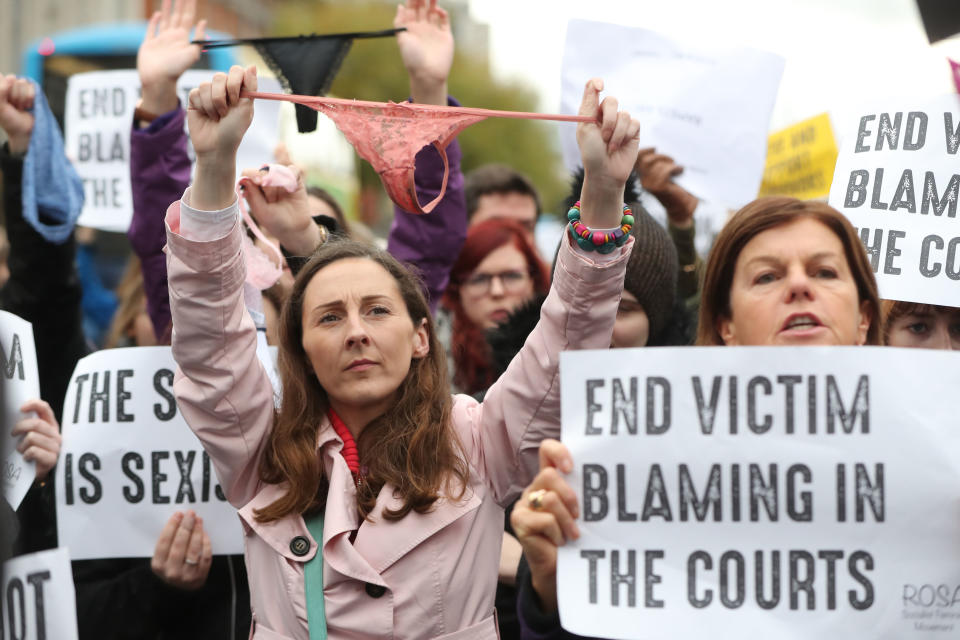Irish women launch #ThisIsNotConsent underwear campaign to protest victim-blaming
Words: Abby Haglage
One week after a lawyer urged a court to focus on the type of underwear a teenage girl was wearing the night she alleges a man sexually assaulted her, Irish women are taking to the streets to protest.
“You have to look at the way she was dressed,” Elizabeth O’Connell, the attorney for the 27-year-old male defendant reportedly told the jury in the contentious trial. “She was wearing a thong with a lace front.”

The jury ultimately found the man not guilty, prompting widespread criticism from women in Ireland — including, on Tuesday, an Irish member of Parliament named Ruth Coppinger.
I hear cameras cut away from me when I displayed this underwear in #Dáil. In courts victims can have their underwear passed around as evidence and it's within the rules, hence need to display in Dáil. Join protests tomorrow. In Dublin it's at Spire, 1pm.#dubw #ThisIsNotConsent pic.twitter.com/DvtaJL61qR
— Ruth Coppinger TD (@RuthCoppingerTD) November 13, 2018
Coppinger brandished a lace thong during Parliament, pulling it from the sleeve of her blazer. Afterward, she posted a picture of it on Twitter, suggesting that victim blaming in sexual assault trials needs to end. “I hear cameras cut away from me when I displayed this,” wrote Coppinger. “In courts, victims can have their underwear passed around as evidence and it’s within the rules.”
In the days before and after Coppinger’s post, women in Ireland have taken up a protest of their own — both on the streets of Dublin and through a hashtag on Twitter titled #ThisIsNotConsent.
Deeply proud of Cork today, who came out with fury & demands for change to the rallying call of "Whatever you wear, wherever you go, Yes means yes and no means no!" #ThisIsNotConsent pic.twitter.com/sjKAAC5NVl
— Fiona Ryan (@CllrFionaRyan) November 14, 2018
Most of my underwear has lace on it. This doesn’t mean I want to be raped. No matter what I wear, no means no!! #ThisIsNotConsent pic.twitter.com/dUBaA702oS
— Clàudia 🎗️ (@catalanaalcor) November 14, 2018
Happy to be a part of this movement and highlighting the injustice of the trial. Disappointed that we even have to do this in 2018. #thisisnotconsent pic.twitter.com/i7AjPrIs0A
— Grace Seymour (@GraceSeymour17) November 14, 2018
A women's choice of underwear should NEVER be used as evidence in a rape trial. NO means NO!!!#ThisIsNotConsent pic.twitter.com/JJJ6VhZUkX
— Sandra Ryan (@SandraRyan01) November 14, 2018
Although sexual assault seems to permeate the news these days, the rate of prosecution for this crime remains disturbingly low. According to RAINN (the Rape, Abuse & Incest National Network), 994 out of 1,000 people suspected of rape will walk free in America. Out of the 1,000, just 310 will be reported to police, 57 of those reports will lead to an arrest, 11 will get referred to prosecutors, seven will receive a felony conviction, and only six overall will get prison time.
While there is little data on how many sexual assault cases in Ireland make it to trial, there have been recent studies showing the ubiquity of victim-blaming in courtrooms. In a 2009 study from Ireland’s Rape Crisis Centre, according to the Irish Times, researchers found a “high frequency with which judges granted defense applications to introduce evidence about complainants’ sexual history — often on the basis of a defense lawyer’s claim that a complainant was promiscuous.”
It’s this culture that the women of Ireland are no longer willing to tolerate. Or, as MP Coppinger captured in a tweet Wednesday afternoon: “Clothes are not consent.”

Follow us on Instagram and Facebook for non-stop inspiration delivered fresh to your feed, every day. For Twitter updates, follow @YahooStyleUK.
Read more from Yahoo Style UK:
A year on from the Weinstein scandal has #MeToo changed the world?
Simone Biles scoops gymnastic win wearing teal leotard in solidarity of sexual abuse victims
Woman says Delta gave her a travel voucher after she was sexually assaulted in midair


